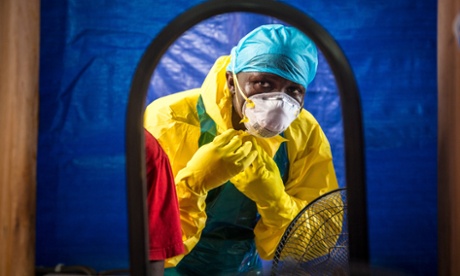Advocacy group One says the global response to the virus has been too slow and funds are stuck in treasury departments

Only 38% of the funds pledged by Australia to fight the Ebola crisis have been distributed to stricken west African countries, an international advocacy organisation has claimed.
Campaigning group One, which boasts over six million members worldwide, has created an online Ebola tracker tool which shows how much funding, equipment and health personnel have been pledged by donor countries and large foundations.
Australia has committed a total of $42m to tackle the disease, $20m of which will go to private Australian company Aspen Medical to operate a UK-built medical centre in Sierra Leone. Another $18m has gone to the United Nations’ Ebola response.
Spokeswoman for One, Friederike Roder, has told Guardian Australia that less than 40% of the money Australia has already committed has made it to Ebola-stricken communities.
“We don’t need words, we need action,” Roder said. “Australia’s response, like the response of many other countries, has been too slow.”
But Roder admits there’s a “lack of clarity” around how and when the money is distributed, saying after countries make their pledges, “no one knows if it is then left in Treasury departments”.
Labor said the government’s response to Ebola leaves Australia in danger of being internationally isolated.
Tanya Plibersek, the opposition foreign affairs spokeswoman, said: ”As the current president of the UN security council, the Abbott government must explain exactly how it is providing leadership on the fight against Ebola, especially given the security council resolution Australia co-sponsored and voted for back in September calling on all nations to do more,”
Australia co-sponsored a UN bill to call for a better global response to the virus, which has killed more than 5,000 people worldwide.
“At the G20 in Brisbane last weekend, the world’s most powerful leaders called on the international community, including Australia, to do more to get the Ebola crisis under control,” Plibersek said.
G20 leaders issued a statement on Ebola following the two-day conference, despite Tony Abbott’s efforts to keep the international meeting focused on economic issues.
Roder welcomed the statement but said the meeting failed to deliver substantive goals in stopping the spread of the disease.
“It [Ebola] made it onto the G20 agenda way too late,” Roder said.
World leaders needed to set out a timetable for how services and resources would be delivered to disease-affected communities, she said.
The comments come as aid agencies defend the slow rollout of services at a newly-built hospital in Sierra Leone. The 80-bed facility, which has been functional for the last fortnight, has only seen 18 patients so far.
Roder said there needs to be more transparency of how resources are being used.
“We need better international coordination. There’s very little information about what’s happening on the ground in west Africa,” Roder said.
The advocacy group has released a video featuring celebrities such as Morgan Freeman and Matt Damon to raise awareness of the disease.
